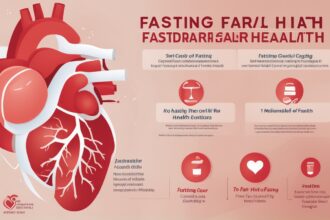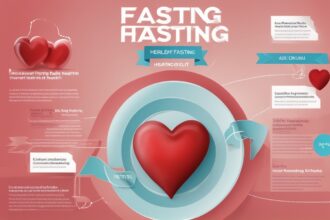Hey there, health enthusiasts! If you’re curious about how to keep your ticker in top shape while embracing a fasting lifestyle, you’ve come to the right place. Today, we’re diving deep into the fascinating connection between heart health fasting and overall cardiovascular wellness. Fasting isn’t just a trend for weight loss or spiritual growth—it’s emerging as a potential game-changer for your heart. In this post, I’ll break down the science, share actionable tips, and explore how intermittent fasting and other fasting methods can support a healthier heart. Let’s get started on this journey to better cardiovascular health!
What Is Fasting, and How Does It Relate to Heart Health?
Fasting, in its simplest form, is the practice of abstaining from food and sometimes drink for a specific period. Whether it’s intermittent fasting (like the 16:8 method, where you fast for 16 hours and eat during an 8-hour window) or longer fasts for religious or health reasons, this practice has been around for centuries. But what does it have to do with heart health fasting
The Science Behind Fasting and Cardiovascular Benefits
Let’s get into the nitty-gritty of how fasting supports heart health. When you fast, your body shifts from using glucose as its primary energy source to burning fat through a process called ketosis. This metabolic switch can lower insulin levels and improve insulin sensitivity, both of which are crucial for preventing heart disease (Patterson & Sears, 2017). Studies have also shown that intermittent fasting can reduce “bad” LDL cholesterol and triglycerides while increasing “good” HDL cholesterol, creating a healthier lipid profile (Tinsley & La Bounty, 2015). Additionally, fasting has been linked to lower blood pressure, a major risk factor for heart attacks and strokes (Wilkinson et al., 2020). These effects aren’t just theoretical—they’re backed by growing evidence pointing to fasting as a heart-protective strategy.
Another exciting area of research is fasting’s impact on inflammation. Chronic inflammation is a silent driver of heart disease, and fasting may help by reducing inflammatory markers in the body. A study found that intermittent fasting decreased levels of C-reactive protein (CRP), a key indicator of inflammation (Moro et al., 2016). While more long-term studies are needed, these findings suggest that incorporating fasting into your routine could be a powerful tool for cardiovascular health fasting.
Types of Fasting for Heart Health
Not all fasting methods are created equal, and choosing the right one for your heart health fasting journey depends on your lifestyle and goals. Here are a few popular approaches that have shown promise for cardiovascular benefits:
- Intermittent Fasting (IF): This includes methods like 16:8 or 5:2 (fasting two days a week with reduced calorie intake). It’s flexible and has been associated with improved blood pressure and lipid levels.
- Time-Restricted Eating (TRE): Similar to IF, TRE limits your eating window to a few hours each day, helping regulate circadian rhythms and potentially reducing heart disease risk factors.
- Alternate-Day Fasting (ADF): This involves alternating between regular eating days and very low-calorie or no-food days. Studies suggest ADF can lower cholesterol and improve heart health markers (Varady et al., 2013).
- Prolonged Fasting: Lasting 24–72 hours or more, this is less common but may trigger deeper cellular repair processes like autophagy, which could benefit the heart.
Remember, while these methods show promise, they’re not one-size-fits-all. It’s always a good idea to consult with a healthcare provider before starting any fasting regimen, especially if you have existing heart conditions.
Practical Tips to Combine Fasting with a Heart-Healthy Lifestyle
Fasting alone won’t magically transform your cardiovascular wellness—it’s most effective when paired with other heart-smart habits. Here are some practical ways to maximize the benefits of heart health fasting while keeping your overall well-being in check:
- Focus on Nutrient-Dense Foods: When you break your fast, prioritize heart-healthy foods like fatty fish, nuts, seeds, leafy greens, and whole grains. These provide essential omega-3s, fiber, and antioxidants.
- Stay Hydrated: Dehydration can strain your heart, so drink plenty of water during fasting and eating windows. Herbal teas or black coffee (without sugar) can also keep you going.
- Ease Into It: If you’re new to fasting, start with a shorter window (like 12:12) and gradually increase the fasting duration to avoid stress on your body.
- Monitor Your Body: Pay attention to how you feel during fasting. If you experience dizziness, fatigue, or chest pain, stop and seek medical advice immediately.
- Pair with Exercise: Light to moderate activity, like walking or yoga, during fasting can enhance fat-burning and support heart health without overtaxing your system.
By weaving these habits into your routine, you’re not just fasting for heart wellness—you’re building a sustainable lifestyle that supports long-term cardiovascular health.
Potential Risks and Considerations for Heart Health Fasting
While the benefits of fasting for heart health are promising, it’s not without potential downsides. Fasting can be challenging, especially for beginners, and may lead to irritability, hunger pangs, or low energy. For individuals with certain medical conditions—like diabetes, low blood pressure, or a history of heart disease—fasting could pose risks if not done under supervision. There’s also the chance of overeating during non-fasting windows, which could negate the heart-protective effects if unhealthy foods are chosen (American Heart Association, 2021).
Another concern is the lack of long-term data on fasting’s impact on heart health. While short-term studies are encouraging, we don’t fully know how sustained fasting affects the cardiovascular system over decades. That’s why balance is key—fasting should complement, not replace, other proven heart health strategies like regular exercise and a balanced diet.
How to Get Started with Heart Health Fasting Safely
Ready to give heart health fasting a try? I’m thrilled to help you take the first step! The key is to start slow and listen to your body. Begin with a gentle approach, like skipping breakfast for a 12-hour overnight fast, and see how you feel. Track your energy levels, mood, and any physical symptoms in a journal to gauge your progress. It’s also wise to chat with your doctor or a dietitian, especially if you’re on medications or have heart-related concerns. They can help tailor a fasting plan that aligns with your unique needs and ensures you’re supporting your cardiovascular fasting benefits without unnecessary risks.
Lastly, don’t rush the process. Fasting is a personal journey, and what works for one person might not work for another. Experiment with different schedules, stay consistent, and remember that small, steady changes often lead to the biggest impact on your heart’s health.
As we wrap up, it’s clear that heart health fasting offers a promising avenue for boosting cardiovascular wellness, from improving cholesterol levels to reducing inflammation. The science is still evolving, but the early evidence—paired with practical lifestyle tweaks—makes fasting a tool worth considering. Whether you’re a seasoned faster or just starting out, remember to prioritize safety, balance, and personalization. Your heart is the engine of your body, and nurturing it through mindful fasting could be one of the best gifts you give yourself. So, why not take that first step today? Share your thoughts or experiences with fasting for heart health in the comments—I’d love to hear from you!
References
- American Heart Association. (2021). Intermittent fasting: What you need to know. Retrieved from https://www.heart.org
- Fung, J., & Moore, J. (2019). The complete guide to fasting: Heal your body through intermittent, alternate-day, and extended fasting. Victory Belt Publishing.
- Moro, T., Tinsley, G., Bianco, A., et al. (2016). Effects of eight weeks of time-restricted feeding (16/8) on basal metabolism, maximal strength, body composition, inflammation, and cardiovascular risk factors in resistance-trained males. Journal of Translational Medicine, 14(1), 290.
- Patterson, R. E., & Sears, D. D. (2017). Metabolic effects of intermittent fasting. Annual Review of Nutrition, 37, 371-393.
- Tinsley, G. M., & La Bounty, P. M. (2015). Effects of intermittent fasting on body composition and clinical health markers in humans. Nutrition Reviews, 73(10), 661-674.
- Varady, K. A., Bhutani, S., Klempel, M. C., et al. (2013). Alternate day fasting for weight loss in normal weight and overweight subjects: A randomized controlled trial. Nutrition Journal, 12, 146.






